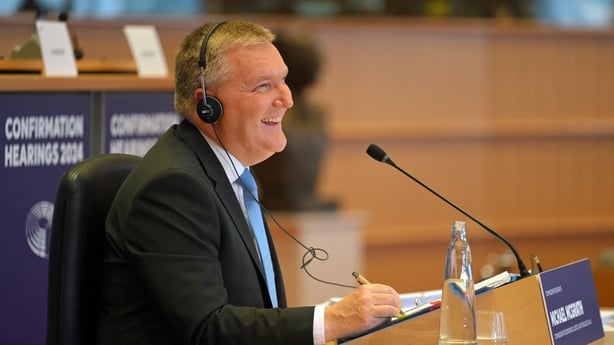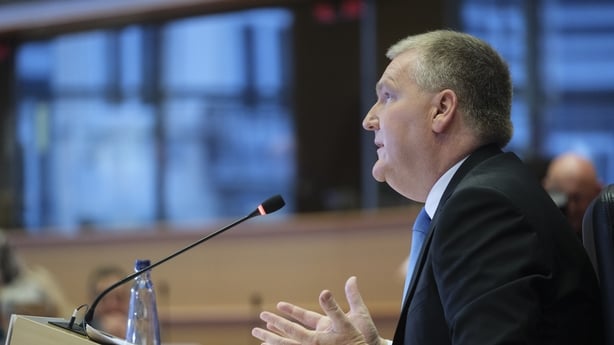Ireland's nominee for the European Commission Michael McGrath has been confirmed following his three-hour hearing this morning, RTÉ News understands.
It is understood the main political groups have supported his nomination to be European Commissioner for Democracy, Justice and the Rule of Law.
Only two of the political groups, the far right Europe of Sovereign Nations and the Patriots group, declined to support Mr McGrath.
This means he has a two thirds majority of the main committee coordinators.
His confirmation will be formally confirmed on 21 November.
Protection of minors from online harm
Mr McGrath told MEPs that he would prioritise the protection of minors from online harm if confirmed as Commissioner for Justice.
He said that in the current geopolitical context, "we must cherish and defend the values that made the EU a beacon of peace, tolerance and hope, including democracy, respect for fundamental rights and the rule of law."
Speaking to MEPs from a number of committees, he paid tribute to Nobel Prize winner John Hume, "one of the politicians who inspired me during my formative years … a peacemaker, statesman and a proud member of this Parliament for 25 years.
"I assure you that in my work, your voice and the voice of the people you represent, will be heard."
Mr McGrath began his opening statement by expressing his condolences to Spanish committee members "on the terrible loss that you have suffered in recent days in Valencia. Our hearts are broken."
He told MEPs that "we must ensure integrity of electoral processes and the safety of election candidates in the face of mounting threats to their security.
"We need to protect election candidates from undue pressure, particularly women who are often subjected to abuse amplified by misogynist stereotypes."
He said the rule of law was "an essential safeguard for the functioning of our democracies, the protection of individual rights and the prosperity of our societies and economies, and lies at the heart of a union of equality, opportunity and social fairness."

Mr McGrath described EU democracy as a "work in progress".
He said that risks to June's European elections included disinformation, threats and sophisticated manipulative methods using AI.
"The fact that there were no major disruptions to the conduct of the elections was remarkable, but it did not happen by chance," he said.
He said the European Public Prosecutor's office would be strengthened under his mandate, in particular in combating cross border serious crime.
"I will work to promote improved cooperation between the EPPO, Eurojust Europol and Olaf [the EU’s anti-fraud agency)."
Mr McGrath also said that, if confirmed, as commissioner he would introduce a Digital Fairness Act to reinforce consumer protection, particularly children.
"I want to make sure that consumers are not exploited for commercial purposes, that social media influencers are not misleading our consumers, and that our children are sufficiently protected online.
"I will address dark patterns, marketing by social media influencers, addictive design of digital products and unfair personalisation practices."
He said he would prioritise the protection of minors from harmful content and practices when playing online games.
Mr McGrath said the safety of journalists would be an integral part of his work, saying he would revise existing legislation such as the European Media Freedom Act to protect journalists, including pushing for the swift implementation of legislation to protect media from abusive lawsuits, known as the anti-SLAPP safeguard.

Asked by a far right MEP if he would crack down on Islamic terrorism and protect "freedom of thought, freedom of speech, equality between women and men," ensuring that there was no EU funding of "NGOs or universities linked to radical Islamic organisations [such as] Hamas", Mr McGrath replied that "respect for our values applies to everyone: democracy, equality, rule of law, freedom, human rights, respect for human dignity. These are non negotiable."
He said freedom of expression was not an absolute freedom.
"There has to be an appropriate balance struck in ensuring that we do not in any way tolerate hateful language or anything that is moving into the criminal area that can have an impact on the citizens of the European Union in relation to funding of NGOs and different groups."
In response to a question from a right wing Polish MEP on EU rule of law actions taken in particular against member states from central and eastern Europe, Mr McGrath said he came to the issue with a "fresh pair of eyes".
"[Impartiality] strikes at the heart of what we need to be about. We have to be impartial in the application of the full rule of law toolbox that we have. I come to this with a fresh pair of eyes. I will make decisions based on the evidence and based on the facts that I see. I do not have any preconceptions."
However, he added: "Nobody should be under any illusions. I will be prepared to act in a strong and forthright way to ensure that the rule of law is respected by every member state of the European Union."
Ireland on pathway to joining EPPO
Responding to a Spanish centre right MEP, who pointed out that Ireland enjoyed significant opt outs from EU justice and home affairs law, Mr McGrath acknowledged this was the case.
However, he said it was Ireland's intention to join the European Public Prosecutor’s Office (EPPO) in time for the Irish presidency of the EU in 2026.
He said: "I would also point to the more recent approach of Ireland when it comes to a range of files: the E-Evidence Regulation, the transfer of criminal proceedings regulation.
"Wherever possible, [the Government will] align the Irish common law system for Ireland to opt into some of the existing and any future instruments for criminal justice cooperation.
"It is something that I will encourage, and I know that Ireland is now on a pathway to joining the EPPO, and I look forward to working with the Irish authorities to make sure that that work is concluded."
Asked by a Belgian MEP if the crime of rape could be criminalised equally across the EU, Mr McGrath pointed out that the Violence Against Women Directive had already been adopted, although it had been impossible in that legislation to include an agreed definition of rape.
He said the European Commission can encourage member states to introduce the concept of consent in their national definitions of rape when transposing the directive.
"We would encourage that. It is an abominable crime, and it is important that there is uniformity and consistency across member states."
He said he would consider including gender-based violence in the list of trans-European crimes.
Digital Fairness Act
Mr McGrath was asked if he would crack down on allegedly addictive features targeting minors online, such as endless scrolling an auto-play videos.
He said: "The business model of big tech…[is that] they want to keep people online constantly, including our children, and that's how to get more money for the advertising that is spent on their platform.
"We understand the model, and we are going to have to address this in the Digital Fairness Act, and I can assure you that that we will, because there are harmful functionalities on these platforms that have an impact on on children, in particular, during those formative years, and the effects can be lasting."
Construction
Ireland West MEP Luke Ming Flanagan challenged Mr McGrath over the Government's failure to carry out market surveillance on construction products, following the infringement proceedings announced by the European Commission in the spring.
Mr Flanagan said the Irish Government had signalled it would "strongly defend its position" and said that it was "not true" that officials were actively undertaking market surveillance of construction products in compliance with EU legislation.
"How can we trust someone from the poacher family to be a game keeper?" asked Mr Flanagan.
Mr McGrath said the Government had responded to the Commission’s infringement proceedings and the Commission would respond accordingly.
"For me, the fundamental issue is that the necessary reform that had to take place is now happening in Ireland. I welcome the fact that in 2022 the Regulation of Providers of Building Works and Miscellaneous Provisions Act was enacted, a very important piece of legislation which is to develop and promote a culture of competence, good practice and compliance with the building regulations in the construction sector."
He said this would involve a statutory register and the Government was "progressing the establishment of an independent building standards regulatory authority."
Consumer Law
Mr McGrath said many EU citizens found consumer law "very complex".
He said: "They can be bamboozled with detailed terms and conditions, and when they seem to vindicate their rights, there are barriers put in their way, and many people just give up.
"So that is why we need to make sure that at member state level, that the organisations that support consumers to vindicate their rights are supported themselves through the member state budgets, and we will do what we can through the European Union as well."







